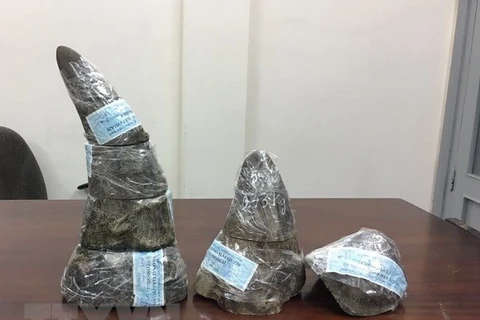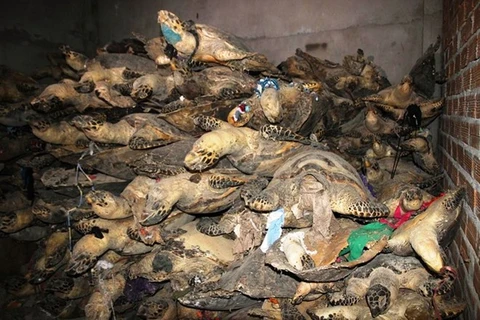Hanoi (VNA) – The Education for Nature – Vietnam (ENV) has suggested that the destruction of confiscated elephant tusks should become a practice, and only samples are preserved to serve education and scientific research purposes.
In response to the World Elephant Day (December 12), the ENV has proposed burning tens of tonnes of elephant tusks along with relevant objects seized over the past decade, aiming to affirm Vietnam’s long-term determination against ivory crimes.
According to the ENV, over the past time, Vietnam has achieved significant achievements in fighting ivory crimes and demolishing elephant tusks in the country.
It is noteworthy that 2.1 tonnes of elephant tusks and hundreds of kilogrammes of rhino horns were crushed in Hanoi in November 2016. Competent forces of the northern mountainous province of Lao Cai also destroyed 43 elephant tusks in 2017.
However, the amount of burnt elephant tusks remains small as compared with more than 53 tonnes captured during the 2010-2018 period, the organisation stressed.
The confiscation of elephant tusks should not be the last objective, the ENV said, explaining that tens of tonnes of elephant tusks and rhino horns and other wildlife products have been trafficked through seaports and airports since early 2017.
Since 2013, the Department of Customs of the northern port city of Hai Phong has seized more than 15,470 kg of elephant tusks, of which over 4,078 kg have been confiscated so far this year.
ENV Deputy Director Bui Thi Ha said the strict punishment against ivory crimes and the destruction of the tusks will reflect Vietnam’s resolve to bust illegal trading rings in the country that is both an ivory consumption market and entrepot.
In August 2018, the People’s Court of Ho Chi Minh City opened a trial against two people who abused their position to appropriate 239.57kg of elephant tusks and 6.14 kg of rhino horns in a warehouse, bagging 3 billion VND.
A robbery involving more than 100 kg of tusks worth 5 billion VND stored in the warehouse of the department of judgement execution in Vinh city, the central province of Nghe An, was also detected in 2013.
These cases have sounded an alarm over risks caused by the storage of a large amount of elephant tusks and rhino horns seized in criminal cases.
Therefore, the destruction of elephant tusks and rhino horns will significantly contribute to busting criminal rings, preventing the abuse of power and position to appropriate these objects, and saving tens of billions of Vietnamese dong spent on storage.
 Hai Phong city’s customs department has so far this year seized more than 4,087 kg of elephant tusks. (Source: Hai Phong city’s Department of Customs)
Hai Phong city’s customs department has so far this year seized more than 4,087 kg of elephant tusks. (Source: Hai Phong city’s Department of Customs) Trading, storing and transporting ivory is forbidden in Vietnam. Violators can be fined from 5-50 million VND or imprisoned from six months to five years.
In August 2017, a “Say No to Ivory” campaign was launched in Ho Chi Minh City with a view to raising public awareness of elephant protection.
The campaign, part of the global wildlife programme “When the buying stops, the killing can too”, was launched by the Centre of Hand-on Actions and Networking for Growth and Environment (CHANGE) and WildAid organisation.
The campaign is set to last for three years.
In Vietnam, WildAid is focusing on measures to change people’s wrong belief in the use of wildlife products, including tusk, through communication publications.
According to the Ministry of Agriculture and Rural Development, the number of elephants in Vietnam has fallen from more than 1,000 to about 100 which mainly live along the border with Laos and Cambodia. Vietnam has become an illegal point of transit for tusks over the last decade.-VNA

























